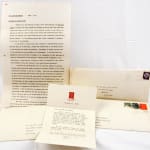Rockwell Kent
Statement by Rockwell Kent on the McCarthy Hearings, 1953
(Ausable Forks, NY)
Together with three Typed Letters, Signed.
1101
Further images
3 legal size sheets containing a photomechanical reproduction of Rockwell Kent's remarks he prepared in advance of his appearance before a hearing of Senator Joseph McCarthy's Permanent Subcommittee on Investigations...
3 legal size sheets containing a photomechanical reproduction of Rockwell Kent's remarks he prepared in advance of his appearance before a hearing of Senator Joseph McCarthy's Permanent Subcommittee on Investigations on July 1, 1953. Although Kent was denied the opportunity to read his statement before the committee, the transcript of his testimony shows a fiery exchange, during which Kent cited his Fifth Amendment rights against self-incrimination when asked whether or not he was a member of the Communist party. Kent's prepared statement offers an even more forceful insight into his application of Constitutional protections which McCarthy's committee threatened: "I believe the investigations into the political beliefs of American citizens and the political tenets of groups of American citizens to be in clear violation of provisions in the Bill of Rights." Kent notes that the nature of the investigations seeks "to deprive entire political minorities of American citizens of their Constitutional rights" for the purpose "of overthrowing our Democracy in favor of a Fascist, totalitarian government." Kent goes on to cite the Declaration of Independence to justify his outrage at the "conspiracy afoot to make us a demoralized people that fears discussion, fears associating with friends, fears even to think" leading him to openly refuse his cooperation: "(T)he cards are stacked," Kent's statement concludes, "I will not play the game." This particular copy of Kent's statement was sent to his friends, Alex and Martha Geckler on January 12, 1954, accompanied by a short typed letter, signed on his Ausable Forks letterhead. The letter and enclosure serve as a response to a previous letter from the Gecklers: "You asked how I got on with "McCarthy the Great" Kent begins, noting the Wisconsin senator's refusal to let him read it. However, Kent felt that he "got a pretty good break." Unfortunately, Kent's break turned out less than beneficial: his work was subsequently shunned by galleries and collectors, both private and institutional; and in 1955, Kent's application for a passport was refused, preventing him from attending a peace conference in Europe. He outlines this turn of events in a two-and-a-half page typed letter, signed - again to the Gecklers -- dated April 6, 1956: "I am refusing to take the oath that they require and claiming that passports must be issued to American citizens regardless of their political beliefs." Kent declares that he is "prepared to carry the fight through to the ... Supreme Court, but that may take a year or two." The decision in "Kent v. Dulles" did not come down until 1958, with William O. Douglas reaching deeply into foundational documents to assert that "(t)he right to travel is a part of the ‘liberty’ of which the citizen cannot be deprived without due process of law under the Fifth Amendment. … In Anglo-Saxon law, that right was emerging at least as early as the Magna Carta.” Gentle mailing folds to statement, and staple in upper left rusted and no longer holding. Fine overall, and letters are accompanied by their original stamped, postmarked envelopes. An important archive from a chapter in contemporary American history that appears poised to repeat itself.









